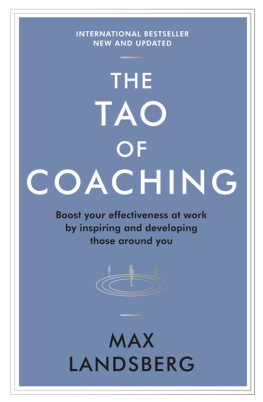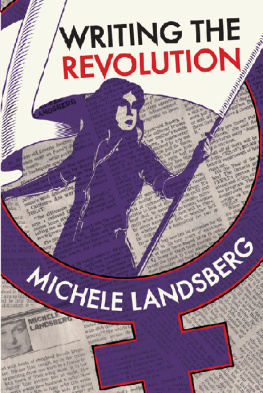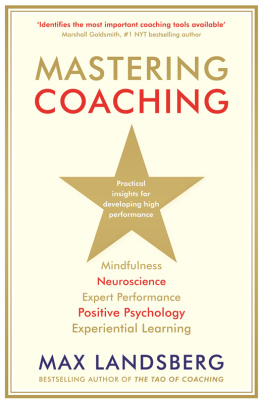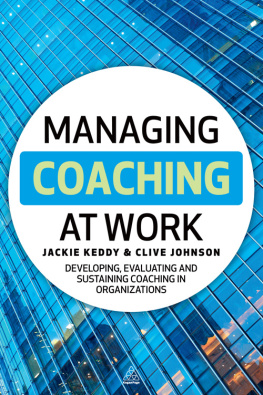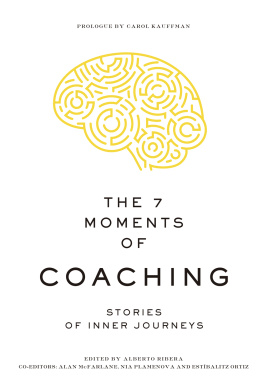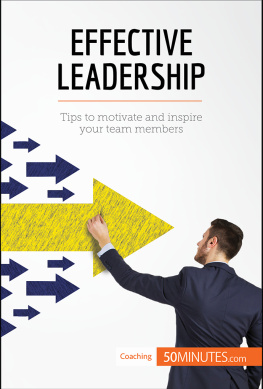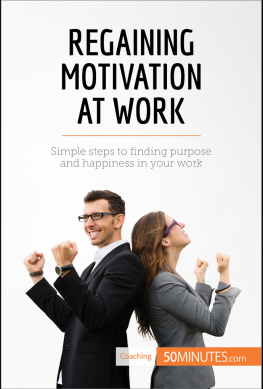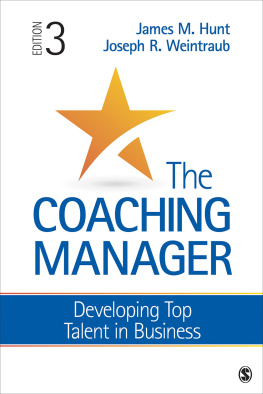Max Landsberg is a board advisor and leadership coach. As a partner at McKinsey & Company, his responsibilities included helping consultants develop their coaching and other professional skills and he developed and led one of the UKs first company-wide coaching programmes. He was also a partner at headhunters Heidrick & Struggles where he established a Leadership Consulting division and advised large organisations on leadership and succession issues. Now a senior partner at Korn Ferry, he specialises in CEO development and succession. He studied Physics at Cambridge, has an MBA from Stanford, and lives in London.
His books draw on more than thirty years of his counselling individuals, teams, and corporations; they have become bestsellers, available in fourteen languages.
Also by Max Landsberg
The Tao of Motivation
Inspire yourself and others. A guide to simple techniques and habits, to help you: Feel and picture the success you want; Tap into your personal energies; Build your confidence, step-by-step; and more.
The Tools of Leadership
How to build Vision, Inspiration and Momentum in the team you are leading or managing. Includes chapters on: Culture and Trust; Charisma and Power; Influence and Timing; and more.
The Call of the Mountains
Sights and inspirations from a journey of a thousand miles across Scotlands Munros and how you too can find adventure.
THE TAO OF
COACHING

Boost your effectiveness at work by inspiring and
developing those around you
MAX LANDSBERG

This paperback edition published in 2015 by
PROFILE BOOKS LTD
3 Holford Yard
Bevin Way
London WC1X 9HD
www.profilebooks.com
First published by HarperCollins in 1996
Copyright Max Landsberg 1996, 2002, 2015
The moral right of the author has been asserted.
All rights reserved. Without limiting the rights under copyright reserved above, no part of this publication may be reproduced, stored or introduced into a retrieval system, or transmitted, in any form or by any means (electronic, mechanical, photocopying, recording or otherwise), without the prior written permission of both the copyright owner and the publisher of this book.
A CIP catalogue record for this book is available from the British Library.
eISBN 978 1782831 839
Contents
To my father who was an excellent coach, and to my mother, who remains one
Introduction
How come whenever I ask for a pair of hands I get a whole person instead?
Henry Ford
The meeting of two individuals is like the contact of two chemical substances: if there is a reaction, both are transformed.
C. G. Jung
I nto this book I have packed all the best tips and techniques for coaching that I have encountered during thirty years of working with teams and individuals. In doing so, my aim is to help you grow the skills of other people whether you are a team leader or a professional coach.
This is a slim volume. That is because to become a great coach you need master only a few techniques, even though mastery obviously requires practice. Each chapter therefore focuses on a specific technique of coaching and, to help you practise, each technique is also illustrated by an episode in the dramatic life of a man called Alex.
The great advantage, when introducing a third edition, is that you actually know roughly to whom you are talking! When this tool kit was originally published in 1996 I thought it might interest a few enlightened business leaders.
But history has proved me wrong: a) the number of enlightened leaders seems to be much greater than I had thought, b) many people have found these techniques also help them talk better with their customers (not just with their own teams), and c) this tool kit seems to be relevant well beyond the mere corporate world the response I cherish most is from a parent who described how the techniques had helped him coach his children.
As a result, this volume and its companions on Motivation and Leadership have sold over 200,000 copies, and have been translated into fourteen languages.
But I have made several substantial changes for this third edition.
Firstly, I have included two new chapters. While many aspects of effective coaching do not change much over time, and our hierarchy of needs remains broadly similar from year to year, there were two topics that I thought deserved more attention and a chapter each: the power of effective questions, and a deeper treatment of goal-setting.
Secondly, I have reviewed Alexs life history and modernised him where he, or the events that impinge on him, needed to be brought up to date
And finally, I have attempted to improve the quality of the prose, aiming to change for the better those paragraphs that had me and some other readers cringing.
Why coach?
So why all this interest in coaching? Selfishness as much as philanthropy seems to be the surprising answer.
People who coach others reap many unexpected rewards. You do not just receive the philanthropic buzz of having helped someone to develop. As a great coach you also:
- Create more time for yourself: having developed the skills of your people, you will be in a position to delegate more.
- Enjoy the fun of working with a band of colleagues who actually relish working with you!
- Achieve better results, as a team, more quickly.
- Build your interpersonal skills more broadly which often means you become better at interacting with your customers, and even with your family and friends.
In other words, the selfish reasons to become a great coach are often just as powerful as the philanthropic reasons. This simple yet powerful observation came as a big surprise to me, as it has to others in the many workshops I have led.
.

Back in the 1990s it was clear that the autocratic leader was facing extinction. This was as true for leaders of families as for leaders of teams and of businesses.
Now it is even clearer that a new breed of leader is called for: a breed with a broader repertoire of management styles sometimes hands-on and sometimes hands-off, as suits the occasion.
More practically, this new breed recognises that even the greatest leader cannot do the whole job unaided. Changes in the business world mean the boss can no longer second-guess the staff, no longer be omniscient enough to monitor everything, no longer omnipresent enough to take all corrective actions required. Yet, at the opposite extreme, the effectiveness of the purely empowering manager has not been proven.
Thus the new leader has to delegate appropriately; requires a following of able apprentices; and is usually the person best placed to build the abilities, on the job, of those who report to him (or her).
This new-style leader also believes that 1) if you invest just ten minutes in coaching someone who reports to you, it will later save you an hour; and 2) you also help yourself when you help others to perform more strongly.
What is coaching, and how to master it?
What are the secrets of excellent coaching, and how might this book help you to acquire them? I have tried to summarise the essence of coaching in the following definition.
- Coaching aims to enhance the performance and learning ability of others.
Next page
